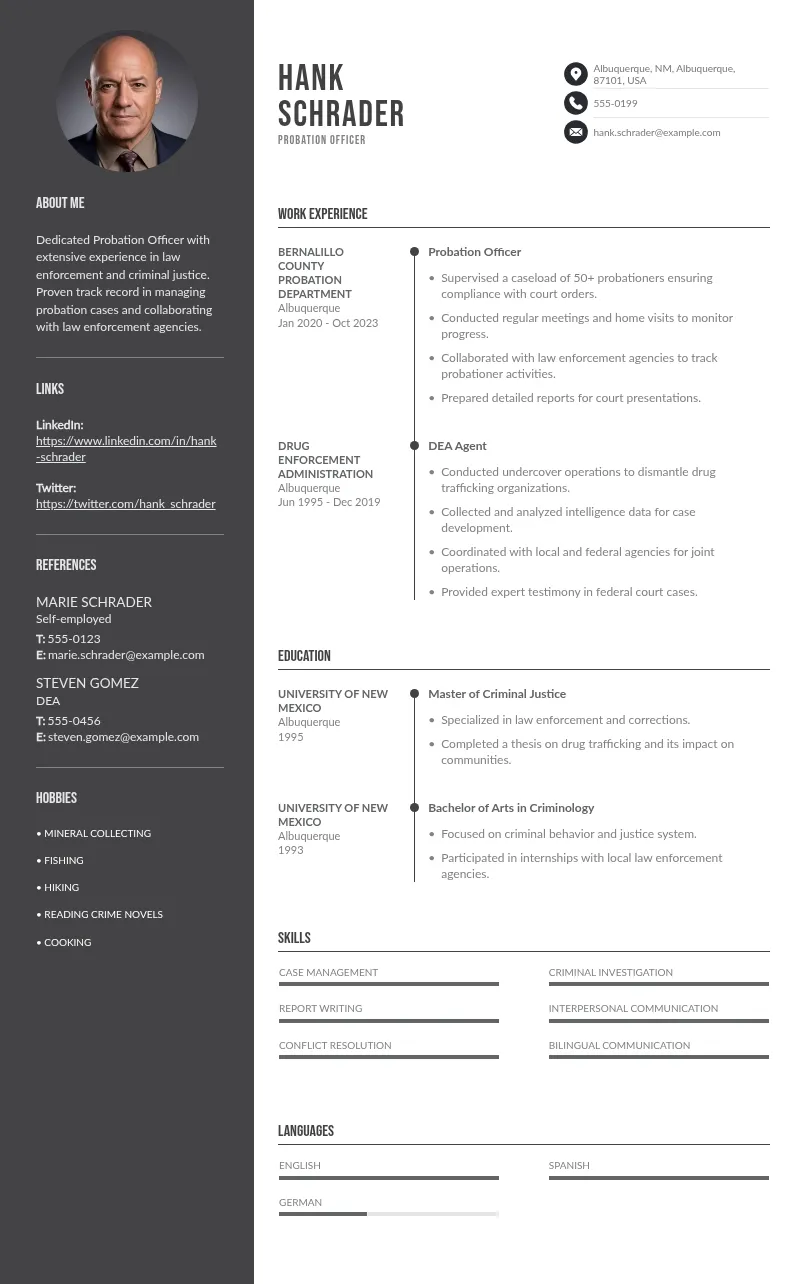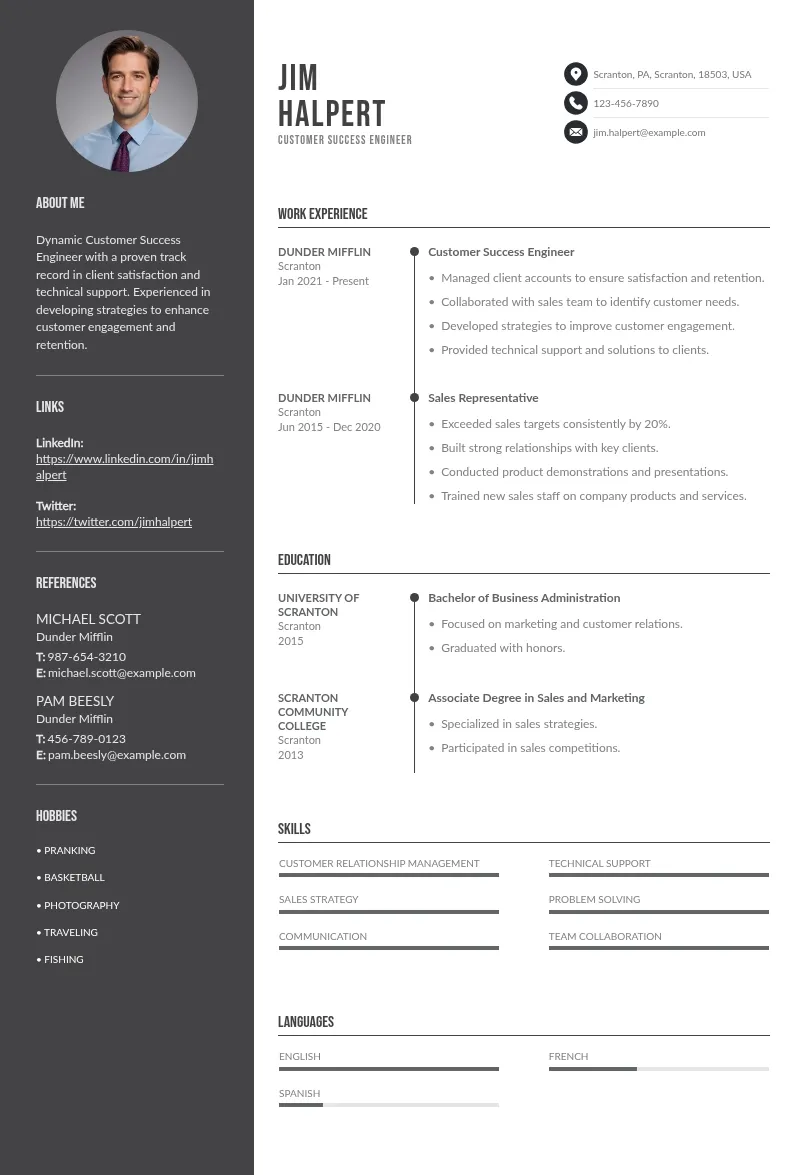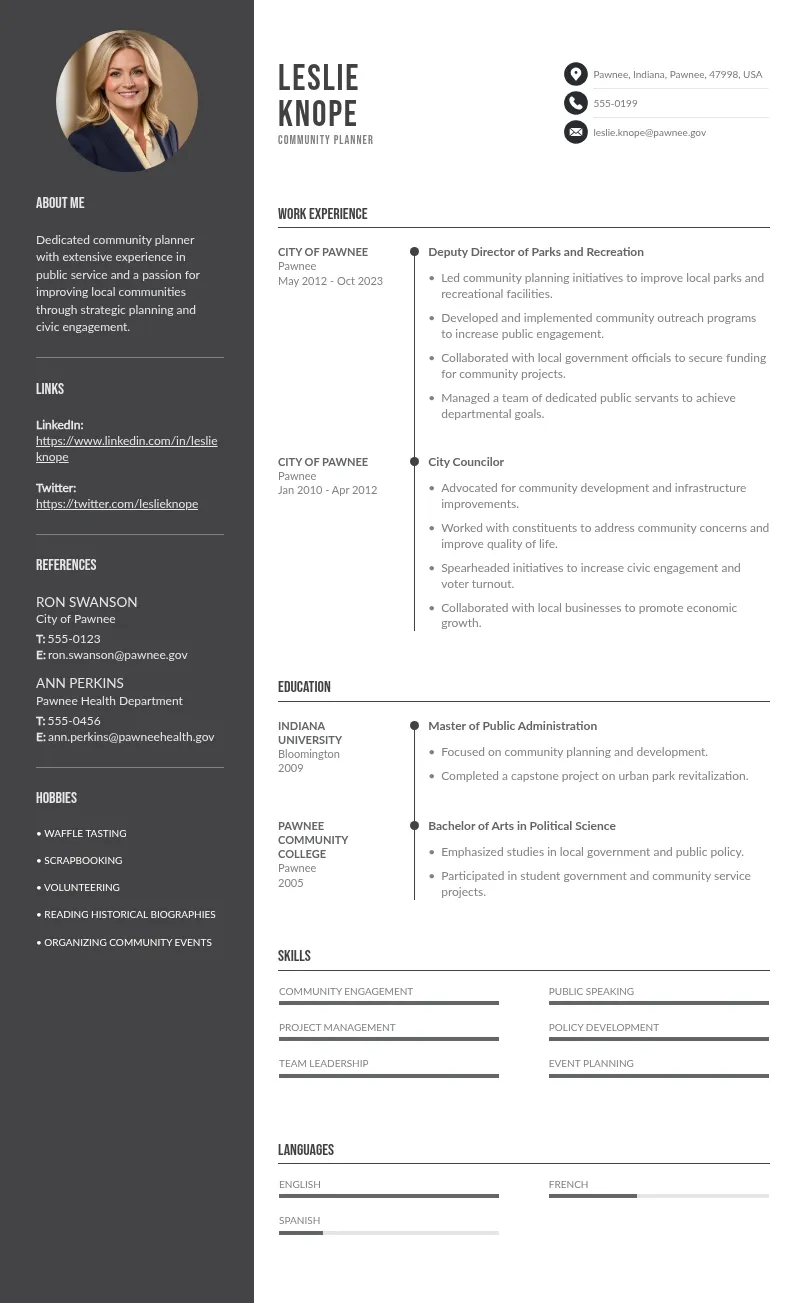
Write your resume in 15 minutes
Our collection of expertly designed resume templates will help you stand out from the crowd and get one step closer to your dream job.


In this guide, we’ll explore the art of showcasing your linguistic talents. We’ll explore strategies and examples. As well as tips. By the end, your resume will speak volumes. Literally! Ready to turn your language skills into a standout feature? Let's get started.
Here's what you can expect in this guide:
- Understanding Language Skills
- Determining Language Proficiency
- Describing Foreign Language Proficiency
- Should I Include Language Certificates on a Resume?
- Common Mistakes to Avoid When Writing a Language Skills Section
Looking for similar articles? Check out these ones to broaden your knowledge:
- Italian Teacher CV: Writing Techniques and Tips
- Mastering the Art of Writing a CV in French: A Comprehensive Guide
- A Job-Winning Spanish Resume Example
- Mastering the Art of Writing a CV in Hebrew: A Comprehensive Guide

Understanding Language Skills
What are language skills?
It's the ability to read, write, speak, and truly understand a language. These skills can range from basic conversational abilities. To really advanced proficiency in professional contexts. There are generally four core language skills:
- Listening: Comprehending spoken language.
- Speaking: Expressing thoughts verbally.
- Reading: Understanding written texts.
- Writing: Communicating through written words.
Why do language skills matter on a resume?
Language skills are really valuable in today’s globalized world. Here’s why:
Enhanced Communication: Proficiency in multiple languages can really improve communication with people from different linguistic backgrounds. Such as colleagues, clients, and stakeholders.
Cultural Competence: Knowing another language comes with a better understanding of different cultures. This can be truly beneficial in diverse workplaces.
Increased Job Opportunities: Many employers prioritize those with multilingual abilities. Especially for roles in international business, customer service, translation, and diplomacy.
Competitive Edge: Highlighting language skills can distinguish you from others. Showcasing you're really commitment to personal and professional development.
Problem-Solving: Learning and using a new language enhances cognitive abilities. As well as problem-solving skills and traits highly valued by employers.
Including language skills on your resume can certainly make you a more attractive candidate. It demonstrates versatility. As well as the ability to adapt to various communication needs in a professional setting.

Determining Language Proficiency
Knowing your language proficiency level is truly key. It actually helps you a lot to accurately showcase your skills on your resume. But how do you figure out where you stand? This section will guide you through very simple methods to determine your proficiency.
How to determine your language proficiency level for a resume
Assessing your language proficiency can be pretty tricky. Here's how to make it simple:
- Online Tests: Take online language proficiency tests. It's great for a quick assessment.
- Official Certifications: Use results from standardized tests. Like TOEFL, IELTS, or DELF.
- Employer Standards: Check if your target employer has some really specific language requirements.
- Real-Life Use: Think about how often and effectively you truly use the language in real scenarios.
Be honest and accurate. Overstating your abilities can backfire. Especially during an interview. Or on the job.
Language proficiency levels: A1, A2, B1, B2, C1, and C2
Language proficiency is often best described using the CEFR scale. Here's a quick breakdown:
- A1 (Beginner): You can use basic phrases. And introduce yourself. Simple conversations are possible.
- A2 (Elementary): You handle everyday tasks. And basic communication. You understand simple texts.
- B1 (Intermediate): You can deal with most situations while traveling. Conversations about familiar topics are easy.
- B2 (Upper Intermediate): You understand the main ideas of complex texts. You can interact fluently. And spontaneously.
- C1 (Advanced): You comprehend a wide range of demanding texts. You can express ideas fluently. And use language flexibly.
- C2 (Proficient): You understand almost everything heard or read. You can summarize information. And express yourself precisely.
Using these levels helps employers understand your abilities really quickly. It adds clarity. As well as credibility to your resume.

Listing Language Skills on a Resume
Showcasing your language skills effectively can actually make your resume shine. Here’s how to do it right. From choosing the right rating system. To deciding the best placement, let's break it down.
Choose a language rating system
First, pick a rating system that’s clear. And recognizable. Here are a few options:
CEFR: The Common European Framework of Reference for Languages uses A1 to C2 levels. It’s widely recognized. And easy to understand.
Interagency Language Roundtable (ILR): The Interagency Language Roundtable scale goes from 0 to 5. It’s very often used by U.S. government agencies.
ACTFL: The American Council on the Teaching of Foreign Languages has a range from Novice to Distinguished. It’s detailed. And precise.
Choose the one that fits your background. As well as the job you're applying for. Make sure it's something your potential employer will really understand.
Format your language skills the right way
Formatting matters. Here’s how to make your resume language skills truly stand out:
- Keep It Simple: Use bullet points for clarity.
- Be Consistent: Stick to one rating system throughout.
- Showcase Proficiency Levels: Don’t just list the languages. Include your proficiency level (e.g., "Spanish (B2 - Upper Intermediate)").
- Highlight Relevant Skills: If the job requires specific language skill or abilities. Make sure they are easy to find.
This format is clean. And easy to read.
Where to put languages on a resume: Skills section, Dedicated language section, or Resume introduction
Placement is really key. Here are your options:
Skills Section: Perfect for most resumes. List foreign languages alongside other skills. It’s simple. And straightforward.
Dedicated Language Section: Ideal if language skill is a major part of the job. It actually highlights your abilities more prominently.
Resume Introduction: Use this for roles where language skill is key. Mention your top languages right at the start.
Choose the placement that best matches the job. And your overall resume strategy. Make your language abilities easy to find. And hard to ignore.

Describing Foreign Language Proficiency
Describing your foreign language proficiency ensures potential employers really understand your skill level clearly. Let’s check how to do this on your resume for job seekers.
How to describe levels of foreign language proficiency on a resume
When listing your language abilities or skills, clarity is really very important.
- Be Specific: Use standard terms. And recognized language scales. Avoid vague descriptors like "basic". Or "fluent" without context.
- Quantify When Possible: If you have scores from standardized tests (like TOEFL or DELF), include them.
- Contextualize Your Skills: Mention how you’ve used the language professionally. Or personally.
This method certainly provides a clear and comprehensive view of your abilities.
Examples of foreign languages on a resume
Here are some ways to actually list a foreign language skills section using different rating systems for job seekers:
Sample resume: Languages
Here’s a sample resume section showcasing how to list languages effectively:



















